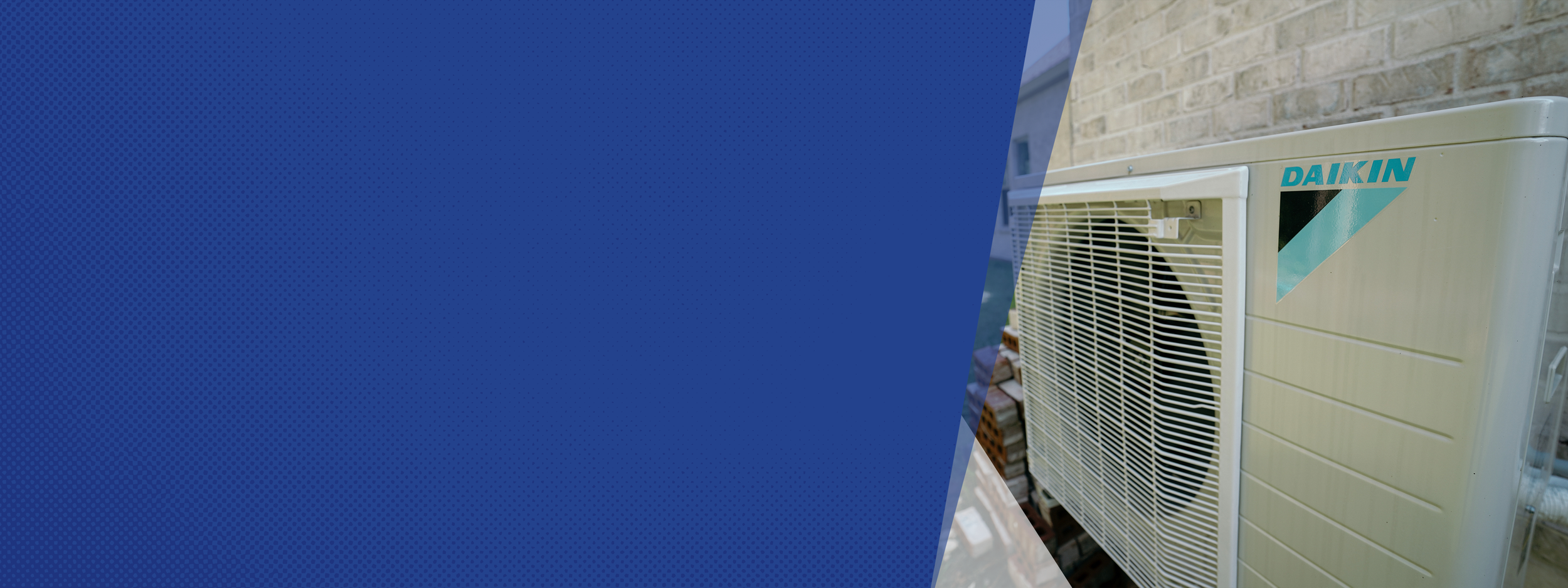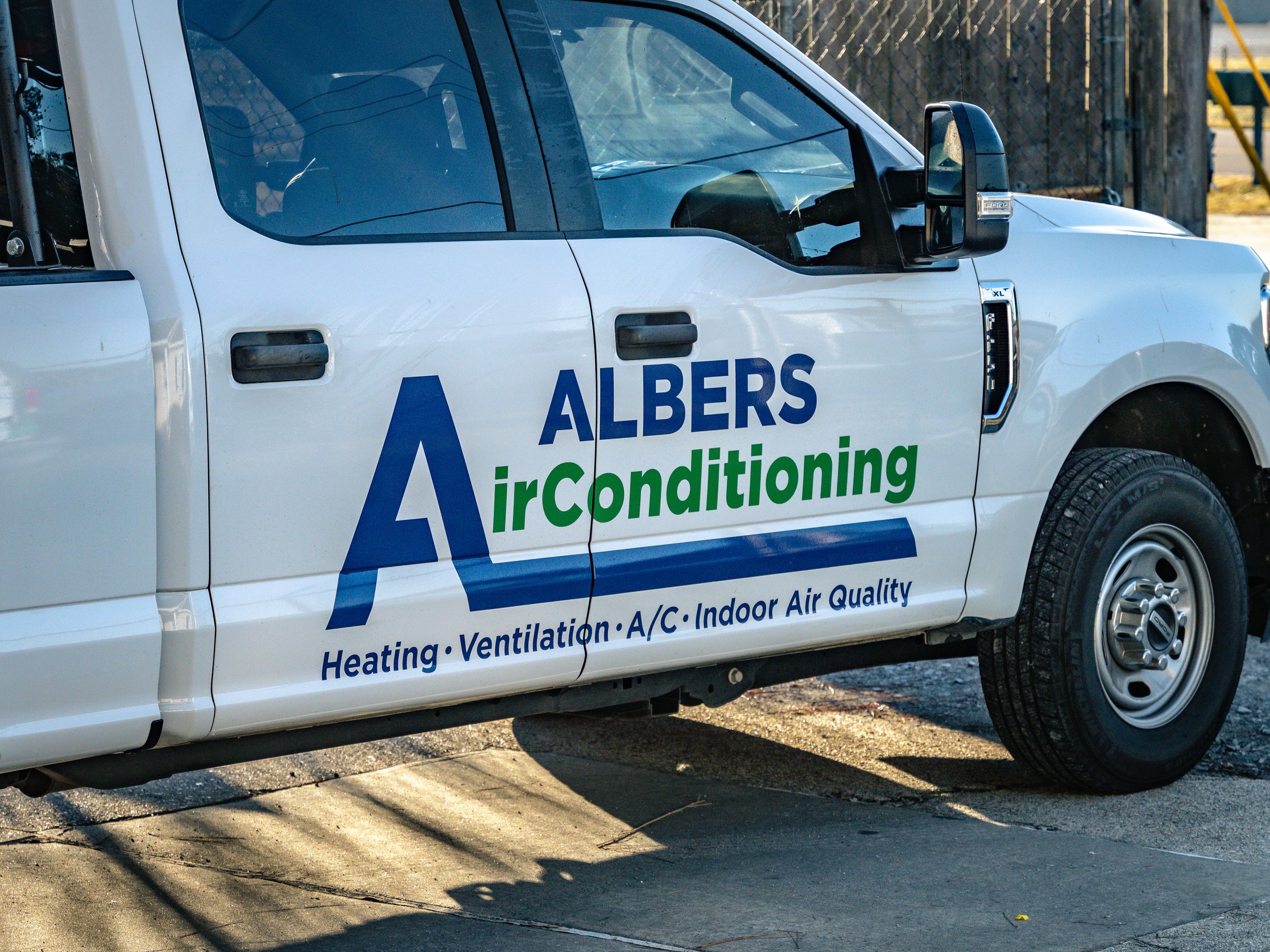
FAQ’s
FAMILY OWNED & CUSTOMER TRUSTED SINCE 1989
UPFRONT PRICING
ON-TIME ARRIVAL
LICENSED & INSURED
Frequently Asked Questions
Whether you need help with your heating or cooling system, you can count on Albers Air Conditioning and our 30+ years of experience.
Your air conditioning and heating system have over 2,000 hours of running time every year, which is equal to driving your car 100,000 miles. Now, imagine how long your car would last if you didn’t periodically take it to a mechanic for maintenance and tune-ups; the same is true for your HVAC system. Most AC and heating manufacturers require periodic maintenance to keep the warranty valid and to ensure the system provides a lifetime of trouble-free service.
If you’ve never considered calling an AC contractor to schedule seasonal maintenance, you should do it now. Regular maintenance ensures that your system runs efficiently and provides you and your family with the comfort you desire all year round.
As one of the most trusted HVAC contractors in the area, we get many questions about our products and services. However, here are the most common questions we get from our customers and area homeowners.
-
Residents know how extreme the weather can be around these parts, which is why your HVAC system must be in tip-top shape all year long. Going days without a functioning HVAC can make life miserable. So, how do you know when a problem deserves a call to a professional HVAC contractor? Here are a few things to consider:
No Cold Air
If the air is blowing, but it’s not cold, it could be that the air filter is dirty, which you can change yourself. However, if the filter is good, it may be a refrigerant leak, which means you’ll have to call in a pro.
Air Won’t Blow
If your system doesn’t blow air at all, check the thermostat to make sure it’s set to ‘cooling’ mode. Again, check the air filter and change it if it’s dirty. Lastly, make sure the system is getting power and you haven’t tripped a breaker or fuse. If you’ve tried all these things but still don’t get airflow, call a professional.
Your AC Short Cycles
Your HVAC system goes through regular on/off cycles. Still, when those cycles become so frequent that your system is running almost continuously, it could mean that you have an air register that’s blowing directly onto the thermostat. Also, don’t forget to check that air filter and replace it if it’s dirty. If all else fails, call an HVAC technician to diagnose the problem.
Clogged Condensate Line
It’s not uncommon for your condensate drain line to become clogged with insect nests, mold, or other debris. However, before you call a professional, try blowing compressed air into the tube to remove the obstructions. Also, try pouring a solution of half bleach and half water into the line to kill the mold.
AC Freezes
If your air conditioner is freezing up, it could be that dirty air filter again. However, if you’ve checked the air filter and it’s clean, look and see if the coils are dirty. Dirty coils and air filters impede the system’s performance and block airflow, which leads to freeze-ups. If you’ve tried everything you can do to fix your air conditioner problem and still aren’t satisfied, call the pros at Albers Air Conditioning for reliable service seven days a week.
-
When your HVAC system runs efficiently, it uses less energy to keep your home at the desired comfort level. One factor that tells you how efficient your system will be is the Seasonal Energy Efficiency Ratio (SEER) rating. Generally speaking, the higher the rating, the more efficient the system is, and the less money you’ll spend on your energy costs. Every state has a minimum SEER standard for new AC units, which is usually 13 or 14. But what exactly is a SEER rating, and how do you calculate it? Manufacturers determine SEER ratings by calculating the annual cooling output during summer divided by the total electrical energy input. The total cooling output is known as the AC’s BTU or British Thermal Unit per hour multiplied by the number of cooling hours per day and per year. For example, if your AC system has a SEER rating of 15 BTU per watt-hour (Wh), you could use the following formula to estimate the energy used per year: 12,000,000 BTUs per year divided by 15 BTU/Wh equals 800,000 Wh per year. To get the annual power usage, divide the A/C’s BTU/h by the SEER rating. While a high SEER rating is an essential piece of your home’s HVAC puzzle, it’s not the only factor to consider when making a purchase. You also must think about your budget, the size of your home, how long is the cooling season, how much time you and your family spend at home, and its predicted life expectancy. If you’re not sure which AC system is suitable for your home, call Albers Air Conditioning and let one of our highly trained experts develop a custom plan specific to your needs.
-
You may have heard about ductless mini-split air conditioners but probably don’t think they can provide the same performance you get from a central air system. However, this isn’t the case. Sometimes, a ductless system makes more sense than a central air conditioner and is the better option. Here are a few benefits that make ductless mini-split systems worth the price.
The most significant advantage these systems provide over central air is the flexibility they offer. TRADITIONAL HEAT PUMPS and central AC systems force air through ductwork; the mini-split systems deliver hot or cold air directly into a particular zone. Also, ductless systems use a small outdoor unit and one or more indoor units, making them much easier and less expensive to install than traditional heat pumps or air conditioners.
Another significant advantage is that ductless mini-split systems save more money than forced air systems. First, ductless mini-split systems don’t require ducts, which means you save money from having them installed. Second, mini-split systems use less power than forced-air machines, which means you spend less money on your utility bills. Lastly, homeowners can create specific zones in their homes, which allows them only to cool those areas that are occupied.
If you’re worried about the environment, then you’ll be happy to know that ductless mini-split air conditioners lower your carbon footprint and provide greater energy efficiency. Also, these systems take advantage of advances in chemistry to reduce their effects on the environment by using a refrigerant called R410A, which is known for its zero-ozone depletion capabilities. Running a ductless mini-split system impacts the environment far less than does a traditional HVAC system.
If you’re still on the fence about a ductless mini-split air conditioner installation or have additional questions, call the experts at Albers Air Conditioning for a consultation.
-
Whether you’re moving into a new home or updating your current one, choosing the right sized air conditioner is an important decision based on the expense. If you choose the wrong sized system, you won’t get the comfort you desire and may end up spending more money on your utility bills than you wanted. So, how do you determine which sized air conditioner is right for you? You can use two methods to get you in the ballpark with the size air conditioner suitable for your house. Central AC systems come in many sizes measured in tonnage. In the AC’s case, tonnage doesn’t measure weight; instead, it measures the system’s ability to cool. One ton is the system’s ability to cool 12,000 BTUs (British Thermal Units) in an hour. So, a two-ton central air conditioner cools 24,000 BTUs per hour. Now, to calculate the size of the air conditioner that’s right for your home, you can use the formula: house square footage times 30, divided by 12,000, which gives you an approximate tonnage. Getting the wrong air conditioner comes with a variety of problems. For example, if your AC is too big, it will likely short cycle, which puts excess stress on the system and reduces its lifespan. Also, short cycling means you’re paying more utility bills because the system is using more energy. If you install a too-small system, the unit will have to run continuously to keep your house cool, again using more energy and costing you more money on your utility bills. If all of this sounds confusing, you can call one of our highly trained expert technicians to inspect and consult.
-
Here in the United States, some of the warmest years ever recorded occurred since 1998. As the climate warms, it’s even more crucial that your HVAC system operates efficiently to keep you and your family comfortable all year long. However, nothing lasts forever, and your HVAC system is like any other machine — it will eventually wear out and require replacing. So, how do you determine when it’s time to bite the bullet and invest in a new system instead of chipping in for more repairs? Here are the top five signs that you need to replace your HVAC system.
INCREASED RUNNING TIME: As your system reaches the end of its lifespan, you may notice that it has to run longer to get your home to the desired temperature. The longer the system runs, the quicker it dies, and the more you’ll pay in utility bills.
STRANGE NOISES: It’s not uncommon for your air conditioner to become louder during operation as it ages. However, if you notice the system becoming too loud or making sounds you’ve never heard before, like grinding or squealing, it means it’s time to replace it.
FREQUENT REPAIRS: Many of your HVAC’s parts are easily replaceable and repairable; however, eventually, it becomes less economical to continue pouring money into an old system rather than upgrading to something more reliable.
LACK OF MAINTENANCE: Many homeowners don’t realize how important seasonal maintenance is for their HVAC systems. However, your HVAC is like any other machine; it requires routine maintenance and tune-ups to keep it running efficiently and replace parts that are beginning to wear out. If you’ve never performed maintenance on your system, you may want to opt for a replacement instead of fixing everything that’s wrong.
AGE: With regular maintenance, your HVAC system should last a little longer than a decade; however, beyond the ten-year mark, the system will likely start costing you more in repairs than it’s worth. Old, inefficient HVAC systems also end up costing you more in energy bills, so you’re better off taking that money and putting it towards an upgrade.
If you’re not sure what kind of shape your HVAC system is in, contact Albers Air Conditioning and schedule an inspection. If you need air conditioner repair or a new system installation, be sure to check out our financing options.

Follow Us On Instagram
Contact Us
Hours
Monday–Friday
7:30am–5pm
Saturday–Sunday
8am–4pm
Phone Number
Slidell: 985-643-6069
Mandeville: 985-624-8831
(fax) 985-643-6858
Email: contact@albershvac.com
















